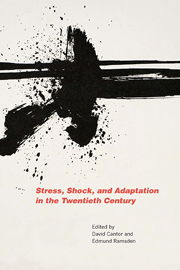
- Publisher:
- Boydell & Brewer
- Online publication date:
- April 2014
- Print publication year:
- 2014
- Online ISBN:
- 9781580468350
- Subjects:
- History, History of Medicine

The modern concept of stress is commonly traced to the physiologist, Hans Selye. Selye viewed stress as a physiological response to a significant or unexpected change, describing a series of stages: alarm, resistance, and exhaustion, when an organism's adaptive mechanisms finally failed. While Selye originally focused on nonspecific physiological responses to harmful agents, the stress concept has since been used to examine the relationship between a variety of environmental stressors and mental disorders and chronic organic diseases such as hypertension, gastric ulcers, arthritis, allergies, and cancer. This edited volume brings together leading scholars to explore the emergence and development of the stress concept and its ever-changing definitions. It examines how the concept has been used to connect disciplines such as ecology, physiology, psychology, psychiatry, public health, urban planning, architecture, and a range of social sciences; its application in a variety of sites such as the battlefield, workplace, clinic, hospital, and home; and the emergence of techniques of stress management in a variety of different socio-cultural and scientific locations. Contributors: Theodore M. Brown, David Cantor, Otniel E. Dror, Rhodri Hayward, Mark Jackson, Robert G. W. Kirk, Junko Kitanaka, Tulley Long, Joseph Melling, Edmund Ramsden, Elizabeth Siegel Watkins, Allan Young. David Cantor is Acting Director, Office of History, National Institutes of Health. Edmund Ramsden is Research Fellow at the Centre for History of Science, Technology and Medicine, University of Manchester.
 Loading metrics...
Loading metrics...
* Views captured on Cambridge Core between #date#. This data will be updated every 24 hours.
Usage data cannot currently be displayed.